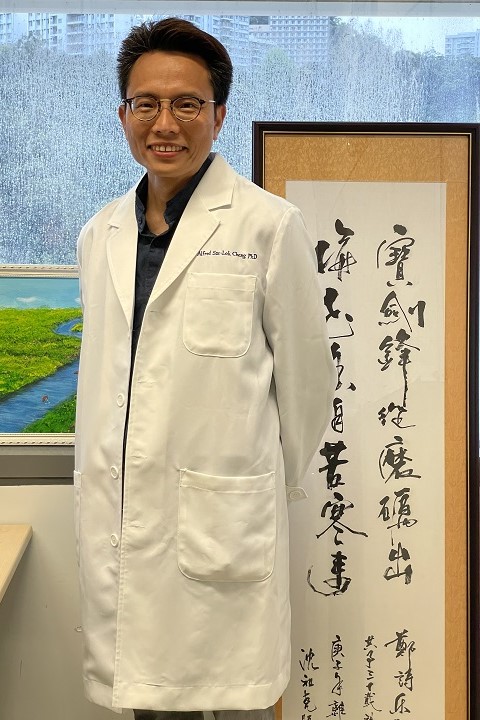Recipient of Sir Edward Youde Memorial Fellowships in 2001/02
尤德爵士紀念基金研究生獎學金 2001/02年得獎者
Constantly engage in scientific research is never easy, it requires a large amount of time and effort to confront with uncertainties. The recipient of Sir Edward Youde Memorial Fellowships in 2001/02, the Assistant Dean of the Faculty of Medicine, the Chinese University of Hong Kong, Prof. Alfred Cheng has directed his path in scientific research by his respected mentor during his doctoral degree; he is now one of the pioneers in developing new treatments for liver cancer.
Prof. Cheng’s keen interest in genetics was developed back in secondary school. After completing his bachelor’s degree in Biology and MPhil in Orthopaedics and Traumatology in CUHK, he was intrigued to look further into the mechanisms of human diseases. He pursued his PhD study at the same university later on and was very honored to be the first PhD student of Prof. Joseph Sung, a world-renowned medical scientist. During his postdoctoral training at Ohio State University, he was introduced to an emerging field in medical science, epigenetics, which later became one of his most vital important research directions on liver cancer. Three years later, he returned to his alma mater to kick start his research career.
By definition, epigenetics refers to changes in gene expressions without any alterations in the genetic sequences. Compared to conventional genetics that changes the genetic codes, this kind of gene regulation is reversible and allows us to modulate gene expression more readily so as to facilitate disease control. Inspired by Prof. Sung, he was curious about why men are more prone to liver cancer, and aimed to study the underlying epigenetic regulation.
With the vision to translate the discovery of epigenetics to clinical application, Prof. Cheng has risen to the challenge to transcend the currently available therapeutic solutions. To improve the efficacy of immunotherapy, he makes use of the uniqueness of epigenetics to alter the functioning of the immune system, thus changing the microenvironment of liver tumour. His latest study showed that tumors could eradicate in laboratory mice with prolonged survival over a year by a new epigenetic therapy. Even when the cancer cells were re-injected into the liver of the mice, their recurrence rate could be largely reduced because of its enhanced immune system.
Even though he has brought a scientific breakthrough to the field, he said that his proudest moment had yet to come. His goal is to apply it into the clinical practice and bring hope to the patients. Currently, his team is collaborating with European medical institutions for drug development based on his discoveries. He hopes that this ambitious goal will soon be realized.
Prof. Cheng admitted there were low times during his research, particularly at the initial stage, when repetitive experiments must be done every day. Despite the slim chance (as little as 0.1%) of making a breakthrough, his fascination with scientific discovery motivated him to anticipate the next 0.1% down the road. Looking back, he is thankful for his mentor’s guidance and continuous support, such that he could be back on track whenever he got lost throughout the years. As a teacher himself, he would not forget the difficulties he has gone through. He keeps his students motivated by showing them the bigger picture ahead, instead of solely focusing on countless experiments.
Prof. Cheng was nominated by his respected teacher, Prof. Sung, for the Sir Edward Youde Memorial Fellowships. As one of his earliest awards, the scholarship serves as an endorsement and encouragement, assuring him that doing research is the right path to pursue. Today, he is one of the principal investigators in the School of Biomedical Sciences at CUHK, leading a team of researchers and students. He still engraves the exemplary guidance from Prof. Sung – being considerate of others rather than oneself – with a hope of passing the spirit of generosity to the next generation of scientists.
從事科研工作往往耗時費力,過程中也充滿種種不確定因素。尤德爵士紀念基金研究生獎學金 2001/02年得獎者,香港中文大學醫學院助理院長鄭詩樂教授,在修讀博士課程期間得到恩師啟蒙,從而奠定了自己的研究方向,致力為病人帶來希望。
鄭教授早在中學時期已經對遺傳學有濃厚的興趣,畢業後到香港中文大學修讀生物學本科及骨科研究碩士,期間開始對人體相關的疾病機制感興趣,更有幸成為世界知名的醫學家沈祖堯教授的第一位博士生。此後他在俄亥俄州立大學繼續博士後研究時接觸到表觀遺傳學,這其後成為了他在肝癌研究中的重要方向。三年後,他再次加入中文大學,正式開展他在母校的研究生涯。
表觀遺傳學,是在不改變基因序列的前提下,令基因表達有所變化。相對於改變基因排列的傳統遺傳學,這個嶄新基因調控模式是可逆轉的,讓我們更容易調節基因表達,從而改變疾病發展進程。在沈祖堯教授的啟發下,他了解到男性較容易患上肝癌的現象,因而開始專門研究肝癌的性別差異機制,跟表觀遺傳學調控的關係。
目前,鄭教授致力透過表觀遺傳學控制基因表達,研究治療肝癌的全新方法,改變肝癌的微環境,令免疫治療更為有效。最新的研究顯示一種新的表觀遺傳學療法可以消除老鼠的肝腫瘤,使其存活率超過一年;即使把腫瘤細胞再次放到老鼠肝臟,其癌症的復發率也會因體內增強了的免疫系統而大大減低。
縱使在研究上取得重大突破,鄭教授依然心急如燎。他希望研究成果能盡快帶到臨床應用,哪怕只為一名病人帶來希望,都會讓他感到無比滿足。目前,鄭教授的團隊正跟歐洲不同醫療機構合作開展藥物研究,期望在不久的將來願望成真。
鄭教授坦言,研究過程並非一帆風順,尤其在研究初期,每天都需要做許多繁複的實驗,雖然只有0.1%的機會有突破,但憑著對科學發現的期盼,便有不斷等待下一個0.1%的動力。在漫長的研究過程中,難免會感到迷失,他感激當年能夠有恩師指點及支持,令他可以看清楚研究方向。而現時他身為老師,會讓一眾學生目光放到更遠大、更全面的發展方向,而非局限於眼前日復一日的實驗。
提到尤德爵士紀念基金研究生獎學金的得獎經歷,當年正正是沈教授推薦他申請獎學金。這是鄭教授在早期研究生涯中的重要獎項,而獎學金對他的認同和鼓勵,更令他堅信選擇科研的道路是正確的。今天,他在中文大學生物醫學院帶領著十多人的團隊;一直銘記沈教授的典範,並期望把待人以寬,律己以嚴的精神傳給下一代的科學家。

